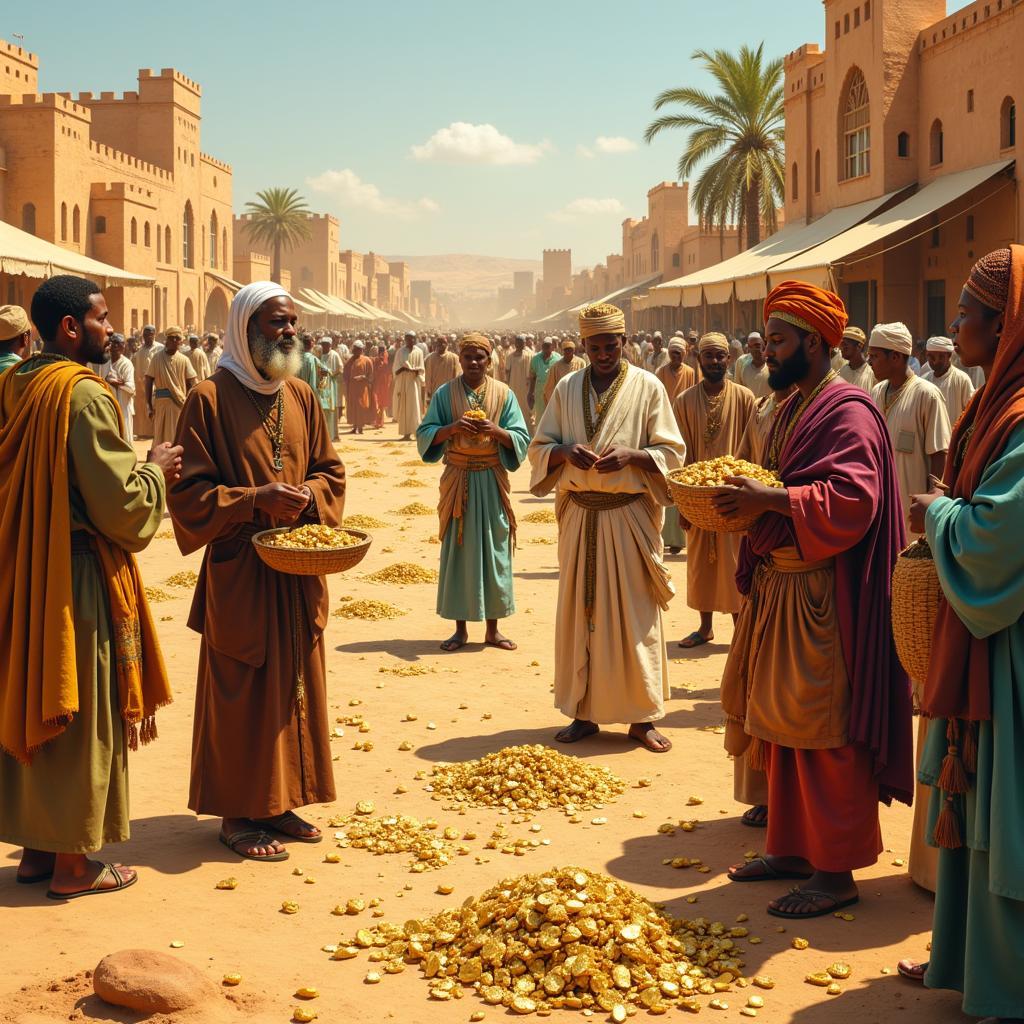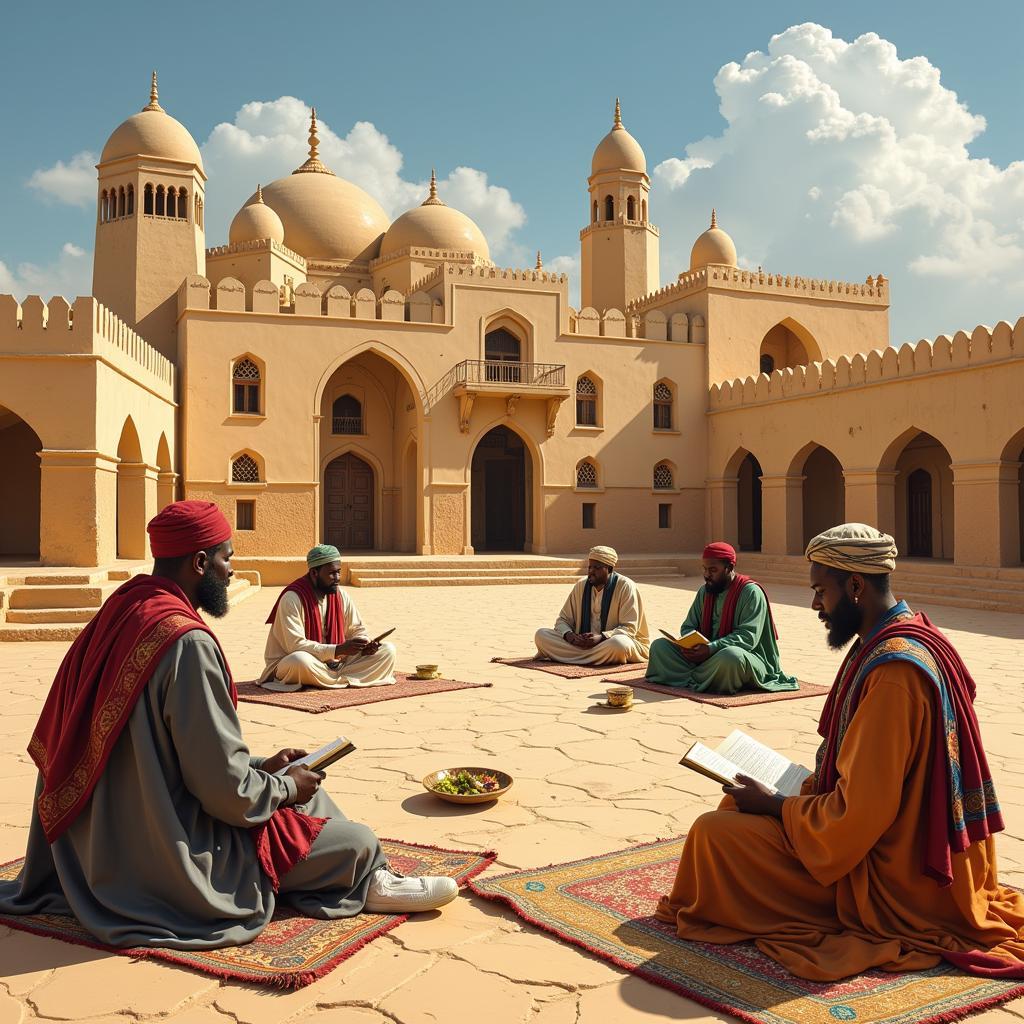Unveiling the Majesty of African King Mansa Musa
Mansa Musa, the African king of the Mali Empire, reigned from 1312 to 1337 and is widely considered one of the richest people in history. His reign marked a golden age for Mali, characterized by immense wealth, territorial expansion, and the flourishing of Islamic scholarship and culture. His famous pilgrimage to Mecca in 1324 cemented his place in history and showcased the vast wealth of the Mali Empire to the world. But who was this enigmatic figure, and how did he amass such a fortune?
Stories of Mansa Musa’s opulence spread far and wide, captivating imaginations for centuries. He controlled vast gold mines, including the famed Taghaza, which contributed significantly to his wealth. His kingdom thrived on trade, exchanging gold, salt, ivory, and other valuable commodities across established trade routes. Mansa Musa’s influence extended beyond his empire’s borders, impacting the economies of regions he passed through during his pilgrimage to Mecca. His lavish spending and generous distribution of gold even caused inflation in Cairo, demonstrating the sheer scale of his fortune. However, Mansa Musa’s legacy goes beyond mere wealth; his commitment to education and infrastructure development transformed Mali into a center of learning and commerce.
Mansa Musa’s Pilgrimage: A Journey of Faith and Opulence
Mansa Musa’s pilgrimage to Mecca was a monumental undertaking, demonstrating his devout faith and showcasing the splendor of his kingdom. He embarked on this arduous journey with a massive caravan comprising tens of thousands of people, including soldiers, servants, and scholars, along with camels laden with gold and provisions. The pilgrimage exposed the wealth and grandeur of the Mali Empire to the world, solidifying Mansa Musa’s reputation as a powerful and influential ruler. He built mosques and established centers of Islamic learning along his route, demonstrating his piety and contributing to the spread of Islam across West Africa. Check out this website about African king of gold.
Mansa Musa and the Golden Age of Mali
Mansa Musa’s reign is often referred to as the golden age of Mali. His leadership transformed the kingdom into a thriving hub of trade, scholarship, and culture. He invested heavily in education, establishing prestigious centers of learning like the Sankore Madrasah in Timbuktu, attracting scholars and students from across the Islamic world. This fostered intellectual exchange and contributed to the preservation and dissemination of knowledge. Furthermore, Mansa Musa implemented significant infrastructure projects, building mosques, libraries, and public buildings, which enhanced the prosperity and prestige of his kingdom. Explore the African civilization timeline to learn more.
Mansa Musa’s Impact on Trade and Economy
Mansa Musa’s control over the trans-Saharan trade routes, particularly the gold and salt trade, played a crucial role in Mali’s economic prosperity. His astute management of these resources contributed to the accumulation of immense wealth for the empire.
“Mansa Musa’s control over trade routes allowed him to strategically position Mali at the heart of commerce in West Africa,” explains Dr. Anika Kwame, a leading historian specializing in African economic history. “His policies fostered economic growth and enabled the empire to flourish.”
 Mansa Musa and the Gold Trade
Mansa Musa and the Gold Trade
The Legacy of Mansa Musa
Mansa Musa’s legacy extends far beyond his wealth. His reign ushered in an era of significant advancements in education, architecture, and infrastructure development in Mali. He is remembered as a devout Muslim, a shrewd leader, and a patron of the arts and sciences. His story continues to fascinate historians and inspire future generations. You might find these African history websites helpful.
“Mansa Musa’s impact on African history is undeniable,” states Professor Ibrahim Diop, a renowned scholar of African history and culture. “His story challenges conventional narratives about Africa and highlights the richness and complexity of the continent’s past.”
 Mansa Musa's Legacy in Mali
Mansa Musa's Legacy in Mali
Conclusion
Mansa Musa, the African king of Mali, remains a captivating figure in history. His immense wealth, legendary pilgrimage, and commitment to education and infrastructure development solidified his place as one of the most influential rulers of his time. Mansa Musa’s story serves as a testament to the rich history and cultural heritage of Africa, inspiring us to explore the complexities and grandeur of its past. For those interested in teaching this fascinating history to younger audiences, consider exploring these resources on African history for children. Delving into the narrative of African gold history can also provide valuable context.
FAQ
- Who was Mansa Musa? Mansa Musa was the ruler of the Mali Empire in West Africa from 1312 to 1337.
- Why is Mansa Musa famous? He is renowned for his immense wealth and his pilgrimage to Mecca in 1324.
- How did Mansa Musa become so rich? Mali’s control over the gold and salt trade contributed significantly to his wealth.
- What was the significance of Mansa Musa’s pilgrimage? It showcased the wealth of Mali and spread knowledge of the empire throughout the world.
- What is Mansa Musa’s legacy? He is remembered for his contributions to education, infrastructure, and the flourishing of Mali’s golden age.
- What was the Sankore Madrasah? A prestigious center of learning in Timbuktu, established under Mansa Musa’s patronage.
- How did Mansa Musa impact trade? He controlled major trade routes and fostered economic growth in Mali.
Need help? Contact us 24/7: Phone: +255768904061, Email: kaka.mag@gmail.com, Address: Mbarali DC Mawindi, Kangaga, Tanzania.